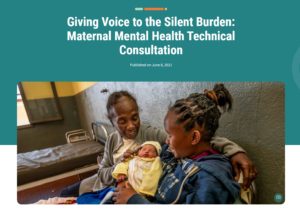
Common perinatal mental disorders (CPMDs), including prenatal and postpartum depression, anxiety, and somatic disorders, are the leading complications of pregnancy and childbirth globally. About one in five women in low- and middle-income countries suffer from one or more CPMD. MOMENTUM Country and Global Leadership, in collaboration with the World Health Organization (WHO) and the United Nations Population Fund (UNFPA), hosted the first Maternal Mental Health (MMH) Technical Consultation from September 7 to 9, 2021. The consultation brought together 650 members of the maternal, newborn, child health, nutrition, and mental health communities from 89 countries to collaborate and inform the path forward to ensure that pregnant and postpartum women receive the respectful and nurturing mental health care they need and deserve.
Day 1
Day 1 provided a global overview of perinatal mental health, featuring experts discussing current evidence and gaps on CPMDs, including women in fragile and crisis-affected contexts and vulnerable populations. Interventions that address CPMDs through the continuum of perinatal care were also highlighted to provide insight into various health system and community approaches.
Day 2
On Day 2, leaders from Pakistan and Zimbabwe shared experiences of forging national policies and practices aimed at integrating MMH services into the health system. Participants also discussed strengthening provider capacity to support quality MMH in health facilities; the role of communities and civil society organizations in MMH care; and integration and linkages between MMH and existing interventions for small and sick newborns, nutrition, and respectful maternity care.
Day 3
Day 3’s objectives were to envision next steps that create pathways for greater visibility, research and implementation in maternal mental health. The presenters discussed opportunities for aligning a movement for MMH with RMNCAH and mental health initiatives; constructing practical recommendations for integrating MMH into community and primary health care settings; and advancing collective action with MMH.